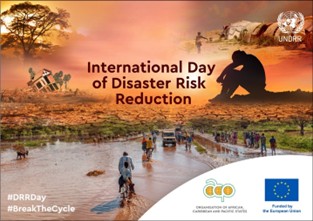Disaster Risk Reduction (DRR)Day on 13 October 2023 highlights the significance of the intra-OACPS Disaster Risk Reduction Programme

13 October 2023 marks “International Day for Disaster Risk Reduction”, and seeks to highlight and emphasise the link between disasters and inequality. By 2030, the world is projected to experience about 560 disasters annually, potentially leading to an additional 37.6 million people living in extreme poverty due to climate change and disasters. In a worst-case scenario, over 100 million more people could be pushed into poverty by 2030, with vulnerable regions like Africa, the Caribbean, and the Pacific being severely impacted. Research indicates that people in poverty are disproportionately affected by disasters.
Access to grant-based climate and disaster risk finance is vital to help vulnerable countries adapt to climate change. COP28 should aim to establish early warning systems for all people worldwide by 2027, prioritizing the most vulnerable communities.
In this context, the Environment and Climate Action Department of the Organisation of African, Caribbean and Pacific States (OACPS), with support from the European Union and UNDP/UDRR co-financing, launched in 2023 the “Intra-OACPS Natural Disaster Risk Reduction (NDDR) Programme”.
The NDRR Programme is a €100.5 million initiative, funded under the 11th European Development Fund (EDF). It is to be implemented in the 79 countries and six regions of the OACPS from 2022 to 2028. The EU is contributing €100 million, with a co-financing from UNDP/UNDRR in the amount of €500,000. The programme aims to reduce the impact of disasters, including from climate-related and other external threats, and enhancing resilience. It will focus on careful an considered planning to reduce countries and communities exposure and vulnerability to hazards.
There are eight implementing partners, each with specific goals, including strengthening disaster risk management, increasing resilience-building investment, and improving preparedness and response to disasters. The Technical Assistance to the OACPS, located in the Secretariat seeks to provide overall coordination, monitoring and evaluation, and knowledge sharing and communication. It will also assist OACPS countries in post-disaster assessments and recovery efforts, promoting South-South cooperation collaboration, and improving disaster risk management and recovery practices. For more information, please contact: Dr. Pendo Maro, Team Leader, pendo.maro@acp.int
